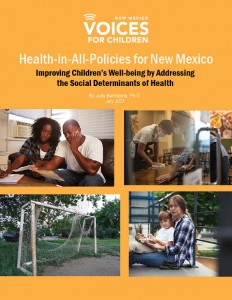Policies to Promote Children’s Health by Addressing the Social Determinants of Health
By Judy Barnstone, MSW, Ph.D., Associate Professor, Highlands University
Download the full report (Aug. 2021; 40 pages; pdf)
Introduction
We all deserve the opportunity for good health, regardless of race, ethnicity, income, or zip code, and that opportunity is tied to much more than access to quality medical care. Children need environments that are rich in resources and supports, and free from dangers, in order grow up to be healthy, happy, and productive adults. However, many families in New Mexico lack or have limited access to the resources and opportunities that are critical for healthy development. Children of color and those in families earning low incomes face structural barriers and systemic inequities related to housing, education, employment, community services, and health care, which can place their development at risk. Inequities in these “social determinants of health” directly contribute to disparities in child and adult health conditions and outcomes, and mortality rates.
While these inequities predate the current public health crisis, never have they been so salient. For many, the COVID-19 pandemic exacerbated risks to children’s health by straining families’ economic resources and limiting their access to health, educational, and social supports. This is particularly true for children in low-income and immigrant households and children of color. Differences in income and wealth, occupation and employment, education and technology resources, housing affordability and quality, transportation, and health care information, access, and coverage have led to dramatically different pandemic-related outcomes, too often with tragic consequences. And while we may not see the health impacts of pandemic-related hardship on children for some time, without public policies that better support our children, we can expect to see increased health disparities down the road.
In this report, we examine the role of the public health system and other health care institutions in promoting health and well-being in New Mexico, but we also look to our physical and social environments to explain observed health disparities and to identify solutions that will promote racial and economic equity, as well as good health, in our state. Ultimately, we propose a “health-in-all-policies” approach for New Mexico. A health-in-all-policies approach works to improve health by considering the positive and negative health impacts of all policy decisions, across all levels of government and all policy areas. Such policies can target the root causes of health problems and correct the social and economic inequalities and barriers to opportunity that lead to poor health. This approach to policymaking is grounded in the belief that it is both avoidable and unjust for communities and groups of people to have different or limited opportunities to be healthy.[i] At the end of this report, we present policies that reduce inequities and expand opportunities related to economic well-being, employment, cradle-to-career education, housing and food quality and affordability, neighborhood and community assets, consumer protections, and taxation.
[i] Health in All Policies: A Guide for State and Local Governments, Rudolph, L., Caplan, J., Ben-Moshe, K., & Dillon, L., American Public Health Association and Public Health Institute, Washington, DC, and Oakland, CA, 2013

